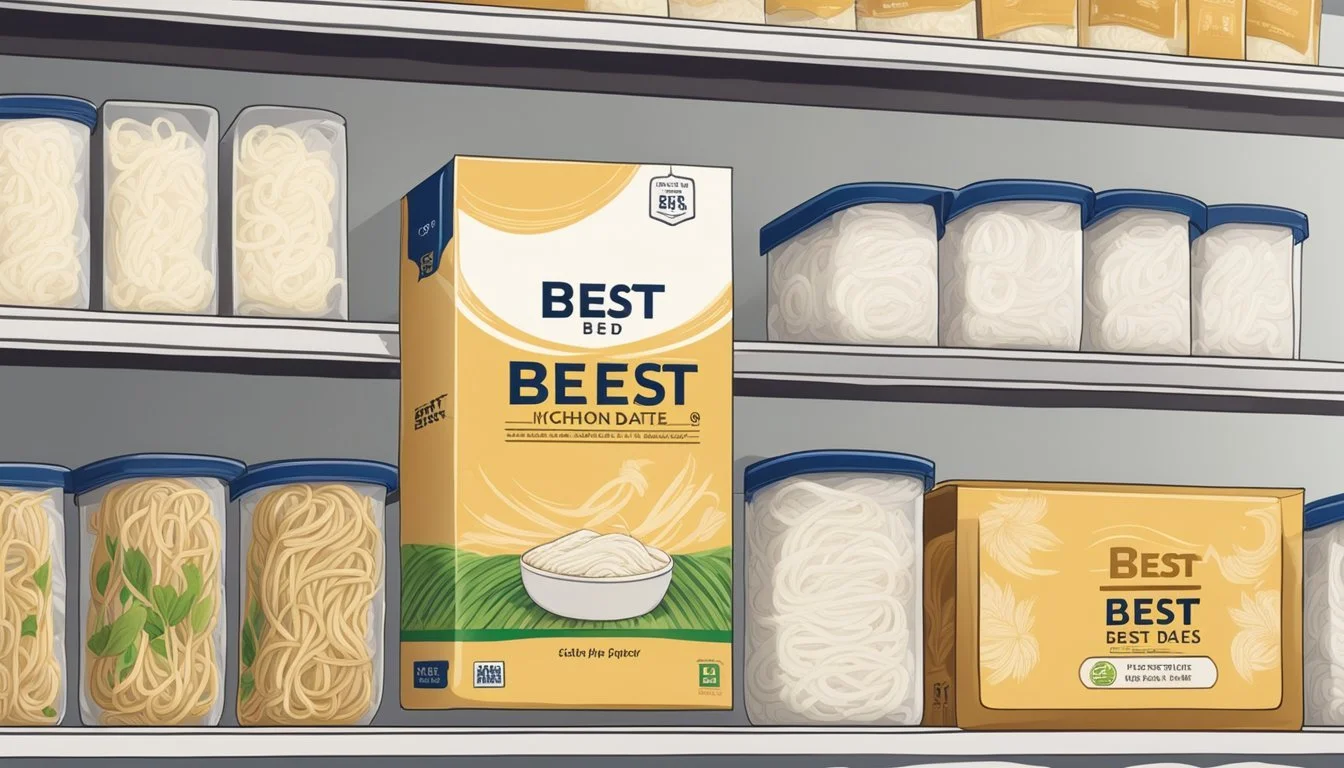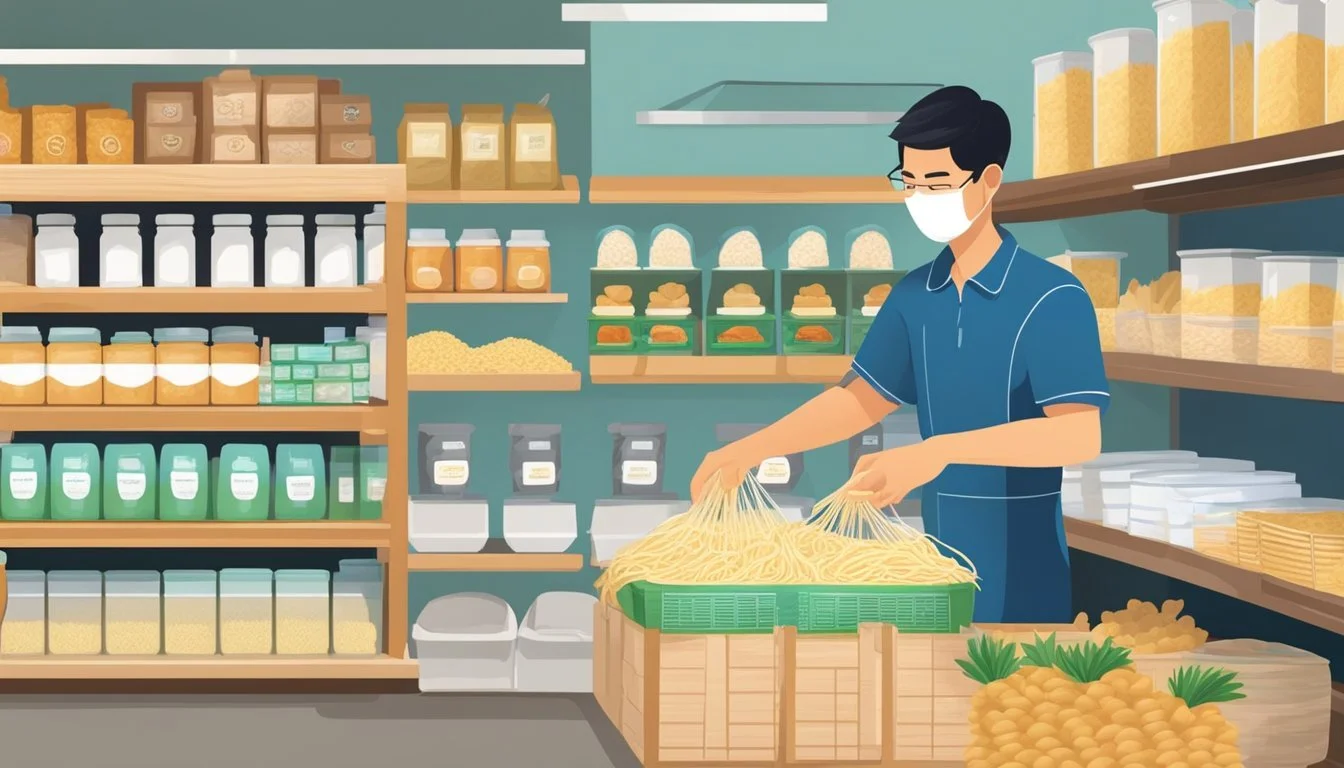How Long Do Rice Noodles Last?
Uncovering Shelf Life and Storage Tips
Rice noodles, a staple in many Asian cuisines, have different shelf lives depending on their form and storage conditions. Fresh, homemade rice noodles typically last up to four days if refrigerated and properly stored. It is essential to keep them in airtight containers to prevent exposure to air and moisture which can accelerate spoilage. Signs of degradation include changes in texture, an unpleasant odor, or discoloration.
In contrast, store-bought rice noodles, particularly the dried variety, have a significantly longer shelf life due to their lower moisture content, which inhibits the growth of spoilage organisms. When stored in a cool, dry place, unopened dried rice noodles can maintain their quality for months and are safe to consume up to their expiration date. Once opened, keeping them sealed and dry extends their usability.
For both fresh and dried rice noodles, the presence of an off odor, a change in texture, or visual discoloration are indicators that they should not be consumed. Stickiness or a slimy feel is a clear sign that fresh rice noodles have gone bad. With proper storage techniques, rice noodles can be a convenient and long-lasting ingredient for a variety of dishes.
Types of Rice Noodles
Rice noodles come in various forms, each with distinct characteristics and shelf lives. They can broadly be categorized based on their state of preparation: fresh, dried, or cooked.
Fresh Rice Noodles
Fresh rice noodles are soft and often sold in sheets or pre-cut widths. They are typically used immediately after purchase and should be stored in the refrigerator. The shelf life of fresh rice noodles is shorter compared to their dried counterparts, lasting about five days when refrigerated.
Dried Rice Noodles
Dried rice noodles are more common and come in numerous thicknesses from very thin to thick. Their shelf life greatly exceeds that of fresh rice noodles due to the lack of moisture, which prevents spoilage. When stored in a cool, dry pantry, dried rice noodles can last up to a year. Always check the packaging for brand-specific storage recommendations.
Cooked Rice Noodles
Once rice noodles are cooked, they enter a new category: cooked rice noodles. Their shelf life diminishes significantly compared to uncooked noodles. If stored properly in a shallow, airtight container or resealable plastic bag in the refrigerator, cooked rice noodles can be expected to last for 3-4 days. Freezing extends this period to two months, although the texture might change upon thawing.
Buying and Storing
When purchasing rice noodles, consumers should focus on the freshness and packaging, which are crucial for longevity. Proper storage is essential to maintain the quality and extend the shelf life of rice noodles.
Selecting Quality Rice Noodles
Customers should examine the packaging for any signs of damage, such as tears or holes, which can compromise the noodles’ quality. The brand can often be an indicator of quality; reputable brands are likely to offer noodles that have been processed and packed to maintain freshness. For fresh rice noodles, one should look for those that are soft yet firm, avoiding any that appear discolored or have a sour smell, as these are indicators of spoilage.
Optimal Storage Conditions
Once rice noodles are bought, storing them properly is key to preserving their texture and flavor:
Fresh Rice Noodles: They should be kept in the fridge in an airtight container and can last up to four days.
Dried Rice Noodles: For longevity, they should be stored in a cool, dry place such as a pantry. Unopened, they can last up to two years.
Freezer: If an individual needs to store rice noodles for an extended period, they can be frozen for up to two months; however, one must ensure they're dry and cool before freezing to prevent moisture build-up which leads to sogginess.
Maintaining a consistent temperature and minimizing moisture exposure are the cornerstones of optimizing rice noodles' shelf life.
Shelf Life and Expiration
Rice noodles have varying shelf lives depending on whether they are fresh, refrigerated, or dried. Understanding expiration dates and recognizing spoilage signs are crucial for safety and quality.
Identifying Expiration Dates
Manufacturers often provide an expiration date on rice noodle packaging to indicate the estimated period during which the product is expected to remain at its best quality. Fresh rice noodles typically have a shorter shelf life and should be consumed within four days to a week if refrigerated, whereas dried rice noodles can last from 8-10 months up to two years when stored in a cool, dry place.
Factors Affecting Shelf Life
Several factors influence how long rice noodles last before they expire:
Storage conditions: Rice noodles should be kept in a cool, dry environment.
Packaging: Properly sealed containers or packages can extend shelf life.
Type: Dried rice noodles have a longer shelf life compared to fresh ones.
Safety and Spoilage Indicators
It's essential to observe the following indicators to determine if rice noodles have spoiled:
Texture: Spoiled noodles may become slimy or mushy.
Odor: A sour or off smell is a clear indication the noodles are no longer safe to eat.
Appearance: Discoloration or mold growth signifies contamination.
Safety: Consuming spoiled rice noodles can lead to foodborne illnesses, including symptoms caused by bacteria such as Bacillus cereus.
Handling Leftovers
When dealing with leftover rice noodles, one's primary considerations should be safety and quality retention. Whether freezing or refrigerating, proper storage practices ensure the noodles remain suitable for reuse.
Properly Freezing Cooked Rice Noodles
To effectively freeze rice noodles, allow them to cool completely after cooking. Place them in an airtight container or a heavy-duty freezer bag, ensuring as much air is removed as possible to prevent freezer burn. They can be frozen for three to four months. When ready to consume, thaw the noodles in the refrigerator before reheating. It is imperative not to refreeze noodles that have already been thawed, as this can compromise their quality and safety.
Refrigerating and Reheating
For short-term storage, rice noodles can be kept in the refrigerator for 3-4 days in an airtight container. To maintain their best texture:
If plain, rinse them with cold water and lightly toss with oil to prevent sticking.
If sauced, store as is, ensuring the container is sealed well.
Reheating involves either adding them directly to a hot soup or using a method such as steaming, microwaving, or a quick stir-fry, which helps retain the texture without drying out the noodles. Always check for signs of spoilage like off odor or texture change before reheating. Leftovers that deviate from their original quality should be discarded to avoid the risk of foodborne illness.
Usage in Cuisine
Rice noodles are a staple ingredient in many Asian dishes, offering versatility and adaptability to a wide range of flavors and cooking techniques. They serve as a vital component in creating authentic tastes and textures in traditional cuisine.
Incorporating into Asian Dishes
Rice noodles are integral to Asian cuisine, providing a gluten-free alternative to wheat-based noodles. Chefs frequently prepare them in beloved dishes such as Pho, a Vietnamese soup teeming with herbs and spices, and Pad Thai, a savory blend of noodles, proteins, and sauces with a signature tangy-sweet flavor. The noodles’ neutral taste and satisfying texture make them ideal for stir-fries and salads. In stir-fries, they effortlessly soak up the savory sauces, marrying with ingredients like tofu, shrimp, or chicken. When used in salads, their light and refreshing texture balance out the robust flavors of the dressing.
Adjusting for Allergies
For individuals with gluten intolerance or celiac disease, rice noodles offer a safe, gluten-free option. This allows them to enjoy a variety of Asian cuisines without concern. Rice noodles are often selected as the foundation for dishes to accommodate dietary restrictions. They are essential in making gluten-free versions of spring rolls, which are wrapped in rice paper (how long does rice paper last?), another allergen-friendly ingredient. By incorporating rice noodles, chefs can ensure that those with specific dietary needs are provided with a flavorful and satisfying culinary experience, without compromising on taste or authenticity.
Practical Tips and Tricks
When it comes to rice noodles, maintaining their freshness after opening and preventing them from sticking are crucial for both taste and texture.
Maximizing Freshness After Opening
Once the package of rice noodles is opened, storage instructions should be followed to maintain their freshness. Transfer the noodles to an airtight container to avoid condensation and place them in a cool, dry area away from direct sunlight. This prevents premature spoilage. If one plans to store the noodles in the fridge, they should use them within 3-4 days for optimal quality.
Preventing Noodles from Sticking Together
To prevent rice noodles from sticking together, one should toss them with a small amount of oil after cooking and cooling them. For storage, it's advisable to use resealable plastic bags or shallow containers. Separate the noodles in individual portions; this simplifies the process of only taking out what is needed and minimizes the noodles sticking together. When reheating, adding a bit of water can help to restore the noodles' separateness.
Comparing Rice Noodles to Other Pasta
Rice noodles and other types of pasta such as traditional wheat-based pasta and vermicelli noodles (how long do vermicelli noodles last?) each have distinct qualities pertaining to texture and shelf life. Understanding these differences can be essential for culinary applications and storage considerations.
Textural Differences
Rice noodles are known for their delicate texture, which becomes slippery and slightly chewy when cooked. They are often thinner and lighter compared to many wheat-based pastas. In contrast, pasta made from wheat has a firmer texture, with a bite referred to as 'al dente' when cooked properly. Vermicelli noodles, which can be made from rice or other starches, are very fine and have a texture that is tender yet slightly springy.
Shelf Life Variations
When it comes to shelf life, uncooked rice noodles and dried pasta differ significantly. Uncooked rice noodles can maintain their quality for up to two years when stored in a cool, dry place. Their shelf life tends to surpass that of fresh noodles but may not be as long as that of dried pasta, which can last indefinitely under optimal conditions. The long shelf life of dry pasta is due to its low moisture content, which inhibits the growth of microorganisms. Fresh noodles, on the other hand, contain more moisture and therefore have a much shorter shelf life, typically lasting only a few days in the refrigerator.
Common Questions about Rice Noodles
When it comes to rice noodles, shelf life and spoilage signs are important. Understanding these can help ensure the noodles are both tasty and safe to eat.
Do Rice Noodles Go Bad?
Rice noodles can indeed go bad over time. Uncooked dry rice noodles have a long shelf life and can last up to a year when stored in the pantry. However, cooked rice noodles should be consumed within 3-4 days when kept in the refrigerator.
How to Tell if Noodles Have Spoiled?
To determine if rice noodles have spoiled, look for the following indicators:
Odor: A stale or strange smell is a strong indication the noodles have gone bad.
Mold: Visible mold growth is a sign of spoilage and the noodles should not be consumed.
Discoloration: If the noodles have changed color, this may suggest they have expired.
Can You Revive Stale Rice Noodles?
Stale rice noodles that haven't spoiled can sometimes be revived for consumption. To do so:
Rehydrate: Soak them in warm water to restore pliability.
Reheat: If previously cooked, gently reheat the noodles to over 165 degrees Fahrenheit to ensure safety, especially if they have been stored for a while.







